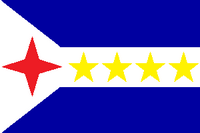Kyotakavian Nationalism (Koytakavia)

Kyotakavian Nationalism is a cultural and political ideology which asserts the right of the Kyotakavian people to have and maintain their own independent state. The movement was born out of the Svozgardan conquest of Kyotakavia which took place in the 1700s, given a means of political expression with the formation of the Protectorate of Kyotakavia in 1800 and was eventually, largely successful at the conclusion of the Third Independence War with the establishment of the United Federal Republic of Kyotakavia, though several major parties, predominantly those who trace their ancestry back to the War, still retain the claim to being "nationalist" political parties though in the modern context, Kyotakavian nationalists typically support the retention of national military service and the maintaining of a large military for the purposes of protection against potential future incursions by the Kingdom of Svozgarda.
Kyotakavian Nationalism represents the antithesis of Loyalism, the political ideology of Svozgardan political parties that operate in Kyotakavia and which supported a retention of the union with Svozgarda, and as a more radical alternative to Reformism which promoted the reforming through political means the system of government in the Protectorate and a renegotiation of the conditions under which the Protectorate existed.
Kyotakavian Nationalism is almost ubiquitously linked with Kyotakavian Paramilitarism, and many of those who would describe themselves as ardent nationalists, would be involved in the Paramilitary movements of the major political parties in the Protectorate.
Strands of Kyotakavian Nationalism
Do-or-Die Nationalism
Do-or-Die Nationalism represents the hard-line, revolutionary form of Kyotakavian Nationalism, with Do-or-Die Nationalists believing that the established borders of Kyotakavia are the defining lines along which the nation must be secured, and believe that whatever sacrifices must be made, human or material, to ensure that Kyotakavia and Kyotakavians have a homeland. Do-or-Die Nationalism firmly believes that no concession could or should be made with Svozgarda on the issue of Kyotakavia's borders and internal policy, as the matter is their own to determine, and hostile action from Svozgarda must be met with a total response as to ensure that their is an "understanding" of the right of Kyotakavians to their home.
The ideology doesn't much discuss ethnic makeup, with broad consensus being that a Kyotakavian homeland does not mean, a country only for Kyotakavians and as a result Do-or-Die Nationalism expresses no view on the claiming of land from ethnic Svozgardans living in Kyotakavia. Nonetheless, Do-or-Die Nationalists often support internment in the case of a war between the two powers of all Svozgardan natives who live in border regions.
History
The first usage of the term Nationalist when referring to a Kyotakavian political ideology came about in the 18th century, with the invasion of Kyotakavia by Svozgarda, used to describe remnant forces who continued to oppose the occupying forces for up to 35 years after the conflict had already ended. It initially was used as a term of derision by Svozgardans but was adopted into the name of a wider political movement which sought the ousting of Svozgardan influence in Kyotakavia at "any cost." Do-or-Die nationalism, as a specific ideology, came into parlance just prior to the 1800 Kyotakavian General Election as a distinguishing term to mark out a difference in approach to the policy of Nationalism between the Farmers' Coalition and NLP with the latter being described as "hard-line" in its stance on indepdence and Nationalism, drawing a lot of its early political presence and membership from former Kyotakavian remnant officers.
Moderate Nationalism
Moderate Nationalism represents the broadly non-revolutionary form of Kyotakavian Nationalism, emphasising a slow political campaign, protected by paramilitaries to ensure the safety of built institutions as well as political efforts to stall, delay and frustrate Svozgardan policy makers and forces into rash decisions that forward the aims of the movement by building popular support for a declaration of independence which will have enough backing as to mean that the Svozgardan government will not attempt a military take-back for fear of major conflict. Moderate Nationalists do not shun violent action however, and Paramilitarism remains a major part of the ideology though usually for "self-defence" reasoning rather than active overthrow and engagement with security forces in combat.
History
National Puritism
National Puritism represents the extreme, ethnic form of Kyotakavian Nationalism, emphasising a belief that a state with the Svozgardan's is impossible and therefore there is a need to exterminate and force out the Svozgardan minority population from Kyotakavia for the purposes of securing an ethnically homogenous state in which Kyotakavian's can live, separate from what National Purists see as "malicious foreign elements" with an emphasis on the need to preserve traditional Kyotakavian practices and encourage large families to expand the population.